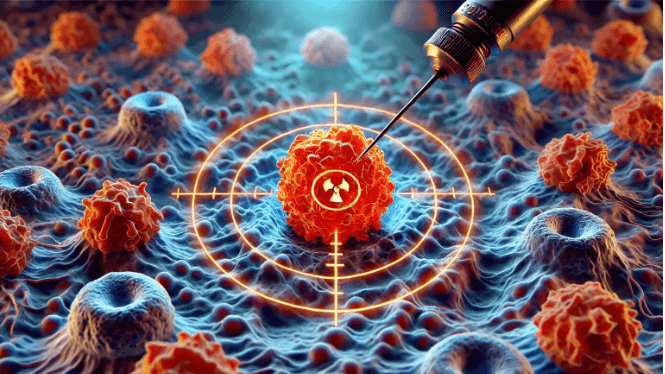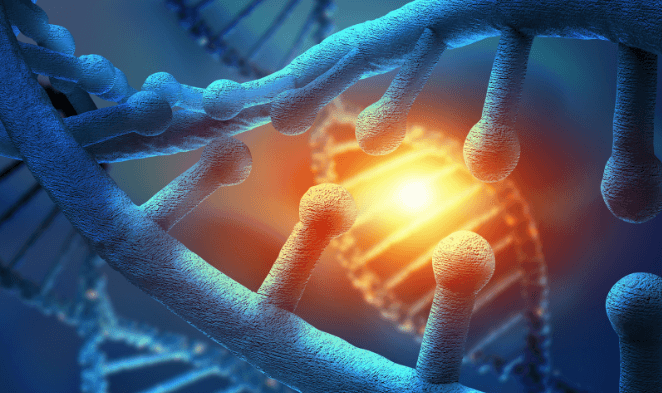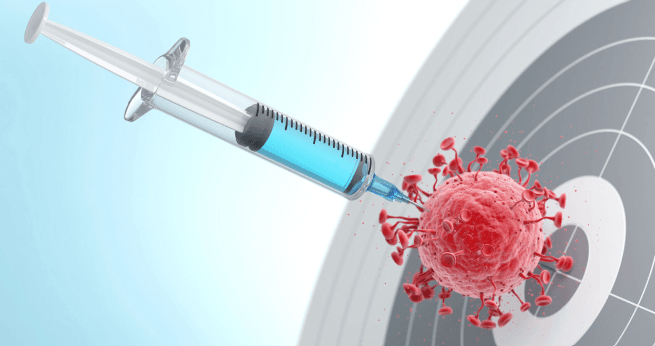The mainstream therapeutic approaches for cancer are Surgery, chemotherapy, and radiation therapy, and chemotherapy being an important component of treatment. However, due to lack of selectivity for tumor cells over normal cells, its success is limited resulting in insufficient drug concentrations in tumors, systemic toxicity and resulting in poor response and discontinuation.
This is where targeted therapy for cancer plays an important role. Targeted therapies also called as precision medicine or precision oncology. These cancer treatments are designed to target the genetic mutations found in a tumor or the normal genes of the concerned patient. It is a form of personalised treatment for the tumour while sparing toxicity to off-target cells.
The most common disease where targeted therapy is used is lung cancer. Cancer is caused by gene changes or mutations. The cell forms protein that also is mutated. This mutated protein makes cells grow out of control or allows the cancer to spread or become resistant to treatment. Targeted drugs attack the mutated proteins in cancer cells thus healthy normal cells are spared.
Most targeted therapies are either small-molecule drugs or monoclonal antibodies. Small-molecule drugs are small enough to enter cells easily, so they are used for targets that are inside cells. There are several kinds of gene targeted therapies for cancer.

Gene Targeted Therapies For Cancer:
Here are the several kinds of gene targeted therapies for cancer
- Tyrosine kinase inhibitors.
- Monoclonal antibodies.
- Antibody-drug conjugates. .
- Proteasome inhibitors.
- Hormone therapies.
- Immunotherapies
Tyrosine kinase inhibitors (TKIs) : Tyrosine kinases are enzymes that are responsible for the activation of many proteins by signal transduction cascades. The proteins are activated by adding a phosphate group to the protein (phosphorylation), a step that TKIs inhibit.
Monoclonal antibodies : Monoclonal antibodies are laboratory-produced molecules that can restore, enhance, modify or mimic the immune system’s attack on cells that aren’t wanted, such as cancer cells.
Antibody-drug conjugates : ADC ‘s are complex molecules consisting of an antibody linked to a biologically active cytotoxic payload or drug. Currently, ten ADCs have been approved by the United States Food and Drug Administration (FDA).
Proteasome Inhibitors : Proteasomes play a necessary role in cell survival, DNA repair and the proliferation of malignant cells. These are drugs that block the action of proteasomes.
Hormone therapies : These drugs starve cancer of hormones it needs to grow. Some breast and prostate cancers require certain hormones to grow.
Immunotherapies: Help the immune system destroy cancer cells. Cancer cells thrive because they can hide from your immune system. Immunotherapies can target cancer cells so it is easier for the immune system to find and destroy them. These therapies help boost your immune system to work better against cancer.

How Does Targeted Therapy Differ From Chemotherapy?
Chemotherapy attacks all cells that grow and divide quickly be it tumour cells or normal healthy cells. Most normal cells recover from the effects of chemotherapy, but because cancer cells are mutated, they usually do not recover.
Targeted therapy drugs have been designed specifically to deliver drugs to particular genes or proteins that are specific to cancer cells or the tissue environment that promotes cancer growth.
Chemotherapy side effects are usually fatigue , easy bruising and bleeding, Infection, Low red blood cell counts (anemia) , Nausea and vomiting, loss of taste, loose stools, Changes in appetite, Mouth, tongue, and throat problems such as sores and pain with swallowing , Nerve problems (numbness, tingling, and pain), Skin and nail colour changes , Urine and bladder problems, Weight changes, feeling low and Mood changes and Fertility problems. Immune checkpoint
Side Effects of Targeted Therapy:
The side effects depend on the targeted therapy prescribed . Unlike other cancer treatments, in Immunotherapy side effects occur because immune cells are attacking the healthy cells similar to autoimmune disease. It is commonly termed as immune related adverse events – irAES.
Many targeted therapy drugs cause a rash or other skin changes. These skin problems usually develop slowly over days to weeks after your treatment starts. Because many targeted drugs are still quite new in the field, it’s difficult to say how long side effects last.
But most are mild and need not discontinue the treatment. While rare, serious skin reactions can happen.
Other Side Effects That Are Commonly Noticed:
- Elevated liver enzymes, which may lead to a change in the drug dosage
- Diarrhea or constipation
- Nausea and vomiting
- Fatigue
- anemia
- photosensitivity and changes in hair growth
- Clotting or bleeding issues
- High blood pressure
- Mouth sores
- Nail changes
Targeted therapy can help people with many common cancers, including:
- Bladder cancer
- Breast cancer
- Colon cancer
- Kidney cancer
- Lung cancer
- Pancreatic cancer
- Prostate cancer
- Stomach cancer
- Ovarian cancer
Targeted drugs can also help people with rare cancers, including:
- Metastatic melanoma (skin cancer)
- Soft tissue sarcoma
- Bone cancers
- Multiple myeloma

Blood cancers such as leukemia and lymphoma can also be treated with targeted therapies.
Tumor genetic testing finds genetic mutations linked to common and rare cancers. The test results show whether a targeted therapy or immunotherapy may work for the kind of cancer you have. Targeted therapy drugs actually “target” a cancer mutation and stop it from driving the cancer’s growth.
Genetic tests of the tumor cells help doctors tell which gene mutations are driving the cancer’s growth. Most of these mutations will be unique to the tumor you have. But some mutations that are targetable with cancer drugs are inherited from your parents. These mutations can be detected by analyzing normal cells, usually blood cells.
If tests identify a targeted therapy that is likely to work for you, you can start treatment right away.
Many targeted therapy cancer drugs widely used today were developed through clinical trials and research studies) led by doctors. Many clinical trials are still ongoing.
The Most Common Cancer Genetic Mutations That Can Be Treated With Targeted Therapy Drugs Include:
- BRAF, which is often mutated in melanoma, thyroid cancer, and colorectal cancer.
- BRCA1 and BRCA2, which are often mutated in breast cancer, ovarian cancer, prostate cancer, and pancreatic cancer.
- EGFR, which is often mutated in lung cancer.
- HER2, which may be mutated in breast cancer, stomach cancer, bladder cancer, and lung cancer.
- IDH1 and IDH2, which are often mutated in acute myeloid leukemia (AML).
- KIT, which is often mutated in a type of soft tissue sarcoma called gastrointestinal stromal tumor (GIST).
- KRAS, which is often mutated in lung cancer, colorectal cancer, and pancreatic cancer.
- PIK3CA, which is often mutated breast cancer and bladder cancer.
- Genetic tumor tests can also find gene changes called fusions, which also can be targeted with drugs. These fusions include:
- BCR-ABL, which is often found in chronic myeloid leukemia (CML).
- ALK, which is often found in lung cancer.
- MET, which is often found in lung cancer.
- NTRK, found across many cancer types in adults and children.
- RET, which is often found in thyroid and lung cancer.
- ROS1, which is often found in lung cancer.
Few Examples Of Targeted Therapies Are :
- Tyrosine kinase inhibitors: Bosutinib, Dasatinib, Imatinib, Nilotinib, Ponatinib, Alectinib, Crizotinib, Afatinib, Erlotinib
- Geftinib: Advanced NSCLC with EGFR exon 19 deletion or exon 21 substitution mutations
- Osimertinib: Advanced NSCLC with EGFR exon 19 deletions or exon 21 mutations or progressive disease on or after EGFR-directed therapy and found to have EGFR T790M mutation
- EGFR Monoclonal antibodies (MABS) : Cetuximab, panitumumab
- Her2 targeting : Lapatinib, Pertuzumab, Trastuzumab
- VEGF targeting : axitinib, cabozantinib, lenvatinib, pazopanib, sunitinib, bevacizumab, ramucirumab
- PD L1 inhibitor: Atezolizumab, Avelumab, durvalumab
- PD 1 inhibitor: Nivolumab, Pembrolizumab
- CTLA – 4 target : Ipilimumab
- PI3K inhinition : Alpelisib
- CD 20 inhibitor: Rituximab
- Proteasome inhibitor: Bortezomib
- CDK 4/6 inhibitors : Abemaciclib, palbociclib, ribociclib
- PARP inhibitors : Olaparib, Niraparib
Targeted therapies can be given in a few ways. You may receive them as an infusion (through a vein or port) an injection or a tablet that can be taken at home.
Targeted therapies are often given alone, but they can also be given along with other treatments, including chemotherapy, immunotherapy, or radiation therapy.
Some targeted therapies are given for a certain period or until there is no sign of cancer. Few targeted therapies are taken for the rest of your life, or until the therapy stops working or causes intolerable side effects.
Collectively, these therapeutic modalities represent a paradigm shift in cancer treatment.
Conclusion:
Targeted therapy is a revolutionary approach in cancer treatment, offering precision medicine by attacking specific genetic mutations in tumors while minimizing harm to healthy cells. It is used for various cancers, including lung, breast, and blood cancers. Unlike chemotherapy, targeted therapy has fewer side effects and can be administered alone or with other treatments. However, targeted therapy cost varies based on the drug and cancer type, making affordability a concern for some patients. Ongoing research continues to improve its effectiveness.

